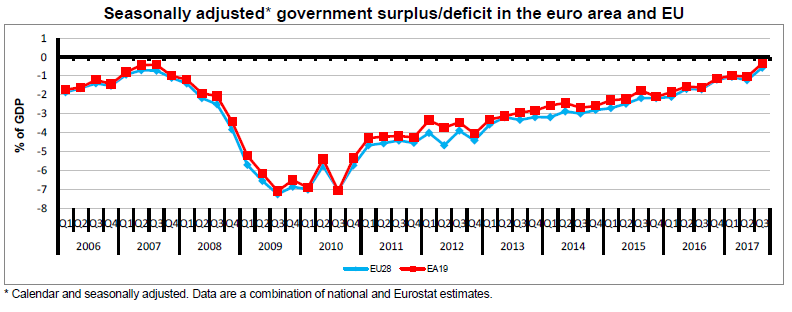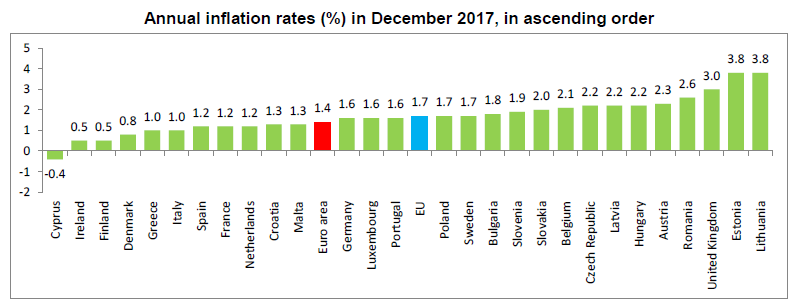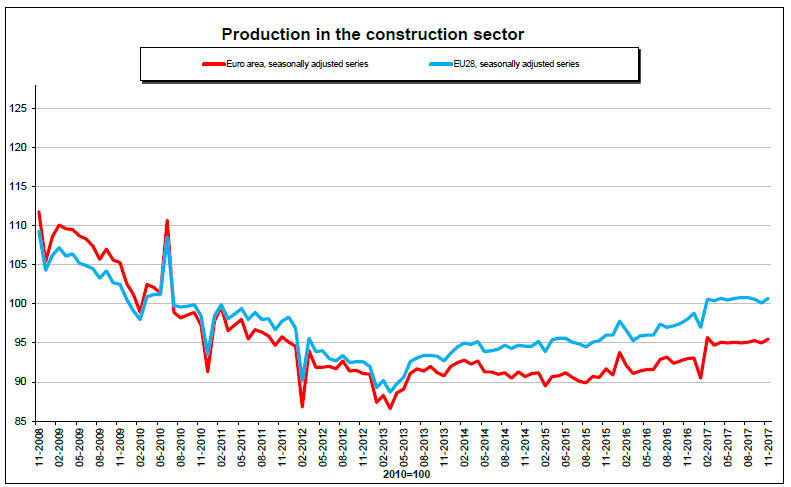Silvia Merler, (2018), “The financial side of the productivity slowdown”, Bruegel, 22 Ιανουαρίου Specifically: (i) firms that entered the crisis with weaker balance sheets experienced decline in total-factor productivity growth, relative to their less vulnerable counterparts after the crisis; (ii) this decline was larger for firms located in countries where credit conditions tightened more; (iii) financially fragile firms cut back on intangible capital investment compared to more resilient firms, which …Read More
Seasonally adjusted government deficit down to 0.3% of GDP in the euro area
Eurostat/Seasonally adjusted government deficit down to 0.3% of GDP in the euro area/24 Ιανουαρίου 2018 In the third quarter of 2017, the seasonally adjusted general government deficit to GDP ratio stood at 0.3% in the euro area (EA19), a strong decrease compared with 1.0% in the second quarter of 2017. In the EU28, the deficit to GDP ratio stood at 0.6%, a decrease compared with 1.2% in the previous quarter. These data are released …Read More
A few good (wo)men – on the representation of women in economics
Ines Goncalves Raposo, (2018), “A few good (wo)men – on the representation of women in economics”, Bruegel, 15 Ιανουαρίου Last week, the American Economics Association Annual Meetings held a session on Gender Issues in Economics and later announced that a new code of professional conduct is in the pipeline. In this blogs review we revise the recent contributions on female representation and perception in economics. Σχετικές Αναρτήσεις Tingyun Chen, Jean-Jacques Hallaert, Alexander …Read More
Inequality and Poverty across Generations in the European Union
Tingyun Chen, Jean-Jacques Hallaert, Alexander Pitt, Haonan Qu, Maximilien Queyranne, Alaina Rhee,Anna Shabunina,Jérôme Vandenbussche,Irene Yackovlev, (2018), “Inequality and Poverty across Generations in the European Union”, IMF, 24 Ιανουαρίου This SDN studies the evolution of inequality across age groups leading up to and since the global financial crisis, as well as implications for fiscal and labor policies. Europe’s population is aging, child and youth poverty are rising, and income support systems are often better equipped to address …Read More
The Inclusive Development Index 2018
World Economic Forum, (2018), “The Inclusive Development Index 2018”, 22 Ιανουαρίου The Inclusive Development Index (IDI) is an annual assessment of 103 countries’ economic performance that measures how countries perform on eleven dimensions of economic progress in addition to GDP. It has 3 pillars; growth and development; inclusion and; intergenerational equity – sustainable stewardship of natural and financial resources.The IDI is a project of the World Economic Forum’s System Initiative …Read More
The macroeconomic performance paradox: A new model
Wendy Carlin, David Soskice,(2018), “The macroeconomic performance paradox: A new model”, Vox, 23 Ιανουαρίου Following the post-financial crisis recession, standard macroeconomic models would have predicted either a destabilising deflationary spiral, or a return to the central bank’s inflation target with a positive ‘neutral’ real interest rate, along with a rebound of productivity growth, falling unemployment, and rising inflation. Σχετικές Αναρτήσεις Francesco Papadia, (2018), «Macroprudential policy: The Maginot line of financial stability«, …Read More
Annual inflation down to 1.4% in the euro area
Eurostat/Annual inflation down to 1.4% in the euro area/17 Ιανουαρίου 2018 Euro area annual inflation was 1.4% in December 2017, down from 1.5% in November. In December 2016, the rate was 1.1%. European Union annual inflation was 1.7% in December 2017, down from 1.8% in November. A year earlier the rate was 1.2%. These figures come from Eurostat, the statistical office of the European Union. Σχετικές Αναρτήσεις OECD, (2018), «OECD annual inflation …Read More
Macroprudential policy: The Maginot line of financial stability
Francesco Papadia, (2018), “Macroprudential policy: The Maginot line of financial stability“, Bruegel, 17 Ιανουαρίου The ability of macroprudential policies to assure financial stability and thus leave central banks free to assign the interest rate tool exclusively to price stability is unproven. As the Maginot line did not protect France from a German invasion in WWII, so macroprudential policy may not be sufficient to counter financial instability. Central banks should prepare …Read More
Production in construction up by 0.5% in euro area
Eurostat/Production in construction up by 0.5% in euro area/17 Ιανουαρίου 2018 In November 2017 compared with October 2017, seasonally adjusted production in the construction sector increased by 0.5% in the euro area (EA19) and by 0.6% in the EU28, according to first estimates from Eurostat, the statistical office of the European Union. In October 2017, production in construction fell by 0.3% in the euro area and by 0.5% in the EU28. Σχετικές Αναρτήσεις …Read More
How to reconcile risk sharing and market discipline in the euro area
Agnès Bénassy-Quéré, Markus K Brunnermeier, Henrik Enderlein, Emmanuel Farhi, Marcel Fratzscher, Clemens Fuest, Pierre-Olivier Gourinchas, Philippe Martin, Jean Pisani-Ferry, Hélène Rey, Isabel Schnabel, Nicolas Véron, Beatrice Weder di Mauro, Jeromin Zettelmeyer, (2018), “How to reconcile risk sharing and market discipline in the euro area”, Vox, 17 Ιανουαρίου The euro area continues to suffer from critical weaknesses that are the result of a poorly designed fiscal and financial architecture, but its members …Read More







